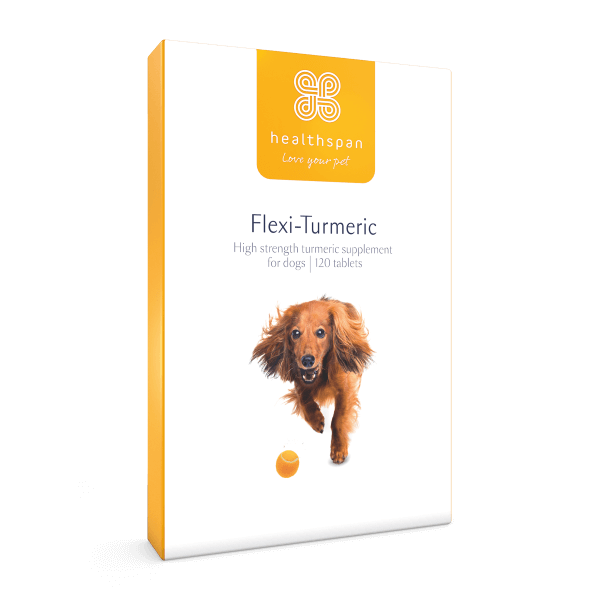Turmeric – the 'golden spice' – has been used for centuries in Ayurvedic medicine. It is extremely versatile: it can be consumed in food, as a drink, as a paste, or in capsules or tablets. It has anti-inflammatory and antioxidant properties in humans,1 and now it's increasingly popular as a supplement for dogs.
What is turmeric?
Turmeric is an Asian plant, Curcuma longa, the root of which yields a vibrant yellow powder used as a colourant and spice. It's used in Ayurvedic medicine, a branch of traditional Indian medicine, to treat an array of conditions in humans – from rashes and arthritis to IBS.
What are its benefits?
Lab-based studies have shown that turmeric has potent suppressive effects on inflammation.2 As inflammation is associated with chronic health conditions, including allergies, colitis, arthritis and obesity, this may explain many of turmeric's potential health benefits.
Unfortunately, these lab-based studies have not translated readily into clinical improvements in either people or animals. Studies are ongoing, but researchers believe the lack of improvement may be due to turmeric's low bioavailability.1
What is bioavailability and why does it matter?
Bioavailability is the amount of a drug that actually reaches its destination in the body and can, therefore, have an effect. Studies have found that turmeric has low absorption, rapid metabolism and rapid excretion from the body;1 in other words, not much of the turmeric we consume makes it into our bodies, and it may not reach high enough concentrations to be effective.
However, researchers have found that bioavailability is improved by giving turmeric with piperine (a component of black pepper), or with fat, such as an oil.1 It's this discovery that drives the interest in golden paste.
What is golden paste?
Golden paste is a formulation that combines oil, water, black pepper, and turmeric into a loose paste that can be given with food. By combining turmeric with fat and black pepper, it aims to increase the absorption of the active ingredients into the body.
How is golden paste made?
The following is an example of how to make golden paste at home. It is simple, requires few ingredients, but needs care, as any spills will dye surfaces and clothes readily.
- Add 50-60g of turmeric to 250-300ml water
- Heat over low heat for 8-10 minutes
- Turn off the heat, add 70ml of coconut oil and two teaspoons of finely ground black pepper
- Leave to cool then decant into a container
- Keep in the fridge and consume within two weeks
Is golden paste better than a turmeric capsule or tablet?
If you are planning on supplementing your dog's diet with turmeric, it is worth giving some thought to the formulation. Turmeric is available in various formulations, but your dog may have a preference.
Dogs aren't known for their discerning palate, but some will refuse to eat food that doesn't look, taste or smell familiar. Because of golden paste's distinctive colour, it will be difficult to hide in food. Additionally, many dogs will find the taste of pepper unpalatable.
Your dog may prefer a flavoured alternative that is palatable and more easily disguised, such as capsules or tablets. If you do choose to use golden paste, introduce it slowly over 7-10 days to familiarise your dog with the sight and taste.

Flexi-Turmeric For Dogs
400mg high-quality turmeric extract
- Supports your dog's mobility and flexibility
- Added vitamin C for immunity and joints, brewer's yeast for taste
- Easy to crumble over your dog’s food
Turmeric and safety
Turmeric is generally considered safe for dogs, but the dose is essential. Because of the low bioavailability (see above), low doses may be ineffective, while higher doses can cause digestive upset. Your careful preparation – and your newly golden kitchen – may be in vain if your dog does not ingest the correct amount.
Always make sure that you offer the recommended amount, and that you know how much of it your dog has eaten. One last consideration when choosing between tablets and capsules or paste is shelf life. Golden paste can last for up to two weeks in the fridge, but it must be kept under optimal conditions.
Feeding your dog any food or supplements that are out of date can cause vomiting or diarrhoea (or worse). Always check that products are within their date and that they've been stored correctly.
Some final thoughts on turmeric and golden paste
If your dog suffers from osteoarthritis or any of the conditions that turmeric may help, first discuss things with your vet. Turmeric, although generally safe, does have some contraindications (situations where it should not be used as it may harm your pet). Turmeric should not be given to pregnant or breeding animals, nor animals with coagulation (clotting) disorders or those with diabetes.
It can interact with some medications, particularly antacids and blood thinners, and it should be used with caution in dogs with liver disease. It's these kinds of issues that always make it worth discussing with your vet before you use any supplements.







